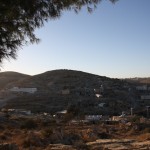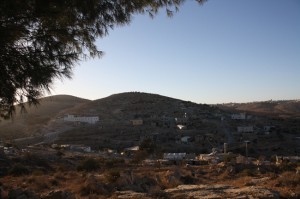
CPTnet Digest
4 January 2011
A newsletter written by members of Christian Peacemaker Teams and Operation Dove.
Operation Dove (Nonviolent Peace Corps of Association “Comunit” Papa Giovanni XXIII) and Christian Peacemaker Teams (CPT) announce the publication of the 2009-2010 report on the Israeli military escort to the Palestinian schoolchildren from the villages of Tuba and Maghayir al-Abeed.
An average of eighteen Palestinian children from the villages of Tuba and Maghayir al Abeed attend school in the neighbouring village of At-Tuwani.
To reach school, the children typically use the primary road that connects their villages with At-Tuwani and passes between the Israeli settlement of Ma’on and the Israeli outpost of Havat Ma’on (Hill 833).
Since 2001, Israeli settlers from Havat Ma’on have routinely attacked the children on their journey to and from school, but it was not until November 2004 that Israeli authorities established a daily military escort.
Despite the Israeli military escort, the children have been victims of violence 104 times between November 2004 and June 2010.
The soldiers carrying out the escort have at times failed to protect the children and have frequently arrived late, causing the children to wait, sometimes for hours, before and after school.
During the 2009-2010 school year, children missed almost twenty-seven hours of school and waited fifty-three hours for military escort after school.
In addition, the soldiers regularly failed to provide a complete escort of the children, almost always leaving the children to walk unescorted beside settlement buildings, in an area where settlers have attacked them.
Despite the children’s right to access education, the military fails to provide a consistent escort for the children. When the military does not arrive, the schoolchildren must take alternative routes that take up to two hours by foot through a rocky, hilly landscape. Furthermore, settlers attack the children and their relatives on these longer paths.
Members of Operation Dove and Christian Peacemaker Teams have had a continuous presence in the village of At-Tuwani since 2004 and daily monitor the military escort of the schoolchildren.
The report, “The Dangerous Road to Education. Palestinian Students Suffer Under Settler Violence and Military Negligence” is available as a PDF. Click here for the PDF document.

